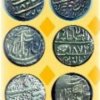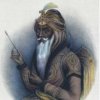The Sikh Empire had its own currency for the first time under the iconic Sikh general, Baba Banda Singh Bahadur. The use of these coins was carried on by subsequent kings of Punjab and reached its epitome under Maharaja Ranjit Singh, who laid the foundations of Sikh Empire. Before Baba Banda Singh Bahadur, the use of coins was prevalent in Punjab, but these weren’t used as currency, albeit as obeisance to the Sikh Gurus.
Baba Banda Singh Bahadur launched first Sikh coin somewhere between 1708 and 1715 A.D. Names of the first guru, Guru Nanak Dev Ji and tenth guru, Guru Gobind Singh Ji, were inscribed on these coins along with dates when these were minted. Hymns from The Guru Granth Sahib were inscribed on these coins later on. The dates indicated on these coins are as per the traditional Indian calendar, the Bikrami Samvat, which is 57 years ahead of the modern or Roman calendar.
When Maharaja Ranjit Singh organized the Sikh Empire, the first coins that were minted under him were dedicated to the first guru, Guru Nanak Dev Ji. The coins minted under him always bore the inscription of leaf of Banyan, a symbol of his empire. During his rule, the coins were minted at eight locations, Amritsar, Anandgarh, Lahore, Peshawar, Multan, Jammu and Kashmir. It is said that during his tenure, the Sikh currency was valued even higher than the French one!
None of the coins released during his tenure bore his name, which was something unique as compared to most other rulers who used to get their own names inscribed on coins issued by them. At the same time, these coins used to have various symbols like a sword, dagger, lotus flower or any other symbol, mainly symbol of the current governor of the province.
After the death of this great king, Sikh Empire got annexed by the British and most of these coins were confiscated by them. These were then remoulded by them and cast into coins dedicated to the Queen Victoria and the British Empire. This is precisely the reason why these coins are very rare to be found.
http://news.ukpha.org/2010/10/coins-of-the-sikh-empire/
Baba Banda Singh Bahadur launched first Sikh coin somewhere between 1708 and 1715 A.D. Names of the first guru, Guru Nanak Dev Ji and tenth guru, Guru Gobind Singh Ji, were inscribed on these coins along with dates when these were minted. Hymns from The Guru Granth Sahib were inscribed on these coins later on. The dates indicated on these coins are as per the traditional Indian calendar, the Bikrami Samvat, which is 57 years ahead of the modern or Roman calendar.
When Maharaja Ranjit Singh organized the Sikh Empire, the first coins that were minted under him were dedicated to the first guru, Guru Nanak Dev Ji. The coins minted under him always bore the inscription of leaf of Banyan, a symbol of his empire. During his rule, the coins were minted at eight locations, Amritsar, Anandgarh, Lahore, Peshawar, Multan, Jammu and Kashmir. It is said that during his tenure, the Sikh currency was valued even higher than the French one!
None of the coins released during his tenure bore his name, which was something unique as compared to most other rulers who used to get their own names inscribed on coins issued by them. At the same time, these coins used to have various symbols like a sword, dagger, lotus flower or any other symbol, mainly symbol of the current governor of the province.
After the death of this great king, Sikh Empire got annexed by the British and most of these coins were confiscated by them. These were then remoulded by them and cast into coins dedicated to the Queen Victoria and the British Empire. This is precisely the reason why these coins are very rare to be found.
http://news.ukpha.org/2010/10/coins-of-the-sikh-empire/



